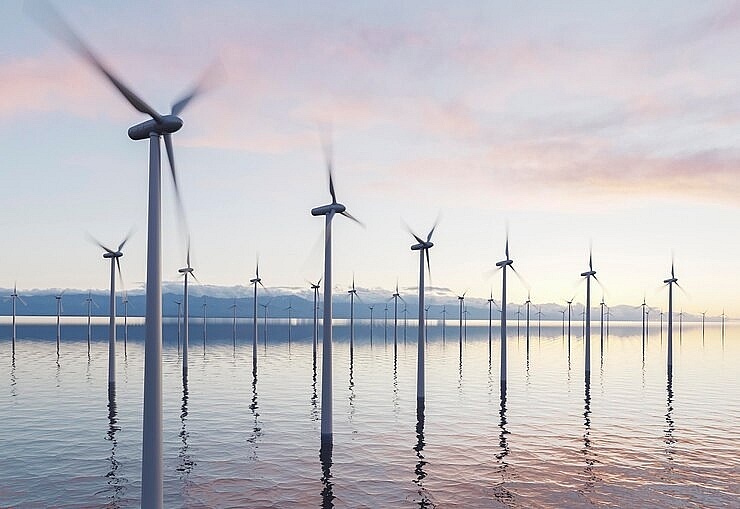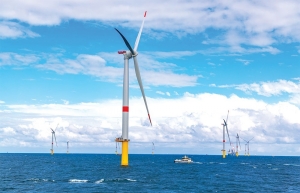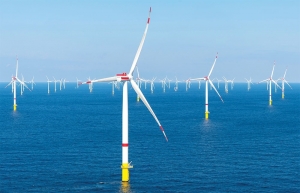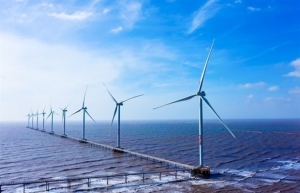Offshore wind power, hydrogen, and gas power awaiting policies
As it finalises the draft hydrogen production strategy and implements offshore wind power and gas power projects, the Ministry of Industry and Trade (MoIT) will shortly submit a report to the government and present its findings to the appropriate authorities for evaluation.
 |
| Offshore wind power, hydrogen, and gas power awaiting policies, source:freepik.com |
Minister of Industry and Trade Nguyen Hong Dien stated at a December 25 meeting that the strategy, which outlines the execution of gas power and offshore wind power projects in accordance with Power Development Plan VIII, has issues surrounding gas power and offshore wind energy initiatives that need to be examined and addressed promptly and simultaneously, from strategies to policy mechanisms.
“Gas power and offshore wind are two crucial energy sources for ensuring national energy security and advancing the energy transition process in Vietnam,” Minister Dien said.
“In addition, the hydrogen development strategy serves as a political orientation and a critical strategy, providing a foundation for the establishment of robust policy mechanisms and facilitating the practical implementation of hydrogen production activities in Vietnam. This not only addresses the demands of the energy transition but also fosters economic progress,” he added.
As stated in a report by the Electricity and Renewable Energy Authority under the MoIT, the execution of gas power and offshore wind power projects in time for commissioning prior to 2030 is a formidable task that demands the involvement of capable authorities and close collaboration among pertinent entities.
Such efforts also serve to safeguard national energy security and facilitate the realisation of Vietnam’s commitment to carbon neutrality.
This report details the investor selection, feasibility study preparation, power purchase contract negotiations, loan arrangement, and execution of engineering, procurement, and construction contracts involved in the execution of gas power projects. The entire process takes approximately 7-8 years.
Pham Van Phong, general director of PetroVietnam Gas (PV Gas), states that the inadequate infrastructure for importing liquefied natural gas (LNG) could impede the advancement of gas power projects and hinder the achievement of objectives outlined in the PDP8.
“The absence of a financial policy, a mechanism to guarantee electricity output coverage, or a mechanism to convert petrol prices to electricity prices in Vietnam have rendered investment projects incapable of ascertaining their capacity to recuperate capital, organising capital, and determining the quantity of LNG imports required to secure competitive petrol prices for electricity production contracts,” said Phong.
Vietnam has a single LNG storage facility at present, according to the general director of PV Gas. PV Gas has successfully concluded and is prepared to supply regasified LNG to consumers in the Southeast region from its import port in the Thi Vai area of the southern province of Ba Ria-Vung Tau, Phong added.
“Other port terminals, such as those situated in import ports that are slated to be incorporated into LNG thermal power initiatives, are confronted with a multitude of challenges and concerns. These encompass technical conditions as well as regulatory issues.”
Phong further underscored that neglecting the integration of LNG import infrastructure with power plants would result in suboptimal resource utilisation, diminished investment efficiency, and inefficient use of Vietnam’s seaport resources.
Le Manh Hung, chairman of PetroVietnam, asserted that at present, all domains associated with the PDP8 implementation fall under PetroVietnam’s purview, with the exception of hydrogen. Nevertheless, investors face significant hazards in gas power and offshore wind power due to the absence of appropriate policies. “However, the lack of mechanisms, policies, and planning, as well as the absence of a location and management agency responsible for approving such projects, pose a significant obstacle,” he said.
Experts in energy and economics concur that international obligations must be carried out expeditiously and that policies and work attitudes must be revised accordingly. The integration of hydrogen production strategies, gas power implementation, and offshore wind power initiatives into the broader national energy strategy is imperative.
 | Offshore developers frustrated at lack of pilot policy There is still currently no legal avenue for foreign or domestic investors to take on offshore wind power pilots in Vietnam. |
 | Answers sought for offshore wind gains Vietnamese authorities are being urged to contemplate strategies to advance offshore wind energy development. |
 | Vietnam stays committed to developing clean and renewable energy Vietnam remains committed and focused on enhancing the development of hydrogen energy production and hydrogen-source fuels in regions with potential and advantages in renewable energy, close to major consumer markets. |
What the stars mean:
★ Poor ★ ★ Promising ★★★ Good ★★★★ Very good ★★★★★ Exceptional
Related Contents
Latest News
More News
- $100 million initiative launched to protect forests and boost rural incomes (January 30, 2026 | 15:18)
- Trung Nam-Sideros River consortium wins bid for LNG venture (January 30, 2026 | 11:16)
- Vietnam moves towards market-based fuel management with E10 rollout (January 30, 2026 | 11:10)
- Envision Energy, REE Group partner on 128MW wind projects (January 30, 2026 | 10:58)
- Vingroup consults on carbon credits for electric vehicle charging network (January 28, 2026 | 11:04)
- Bac Ai Pumped Storage Hydropower Plant to enter peak construction phase (January 27, 2026 | 08:00)
- ASEAN could scale up sustainable aviation fuel by 2050 (January 24, 2026 | 10:19)
- 64,000 hectares of sea allocated for offshore wind surveys (January 22, 2026 | 20:23)
- EVN secures financing for Quang Trach II LNG power plant (January 17, 2026 | 15:55)
- PC1 teams up with DENZAI on regional wind projects (January 16, 2026 | 21:18)

 Tag:
Tag:




















 Mobile Version
Mobile Version